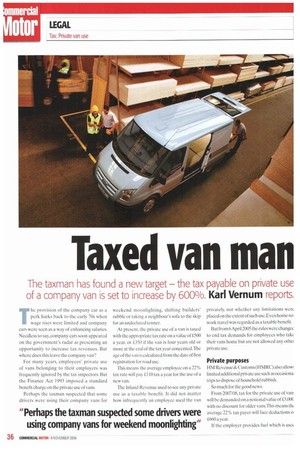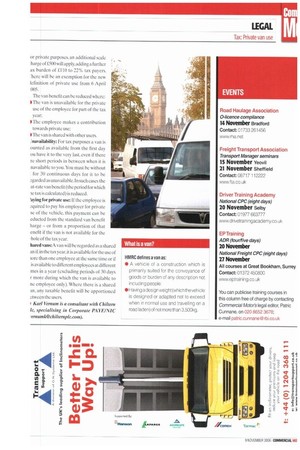Taxed van man
Page 36

Page 37

If you've noticed an error in this article please click here to report it so we can fix it.
The taxman has found a new target — the tax payable on private use of a company van is set to increase by 600%. Karl Vernum reports.
The provision of the company car as a perk harks back to the early 70s when wage rises were limited and company cars were seen as a way of enhancing salaries. Needless to say, company cars soon appeared on the government's radar as presenting an opportunity to increase tax revenues. But where does this leave the company van?
For many years, employees' private use of vans belonging to their employers was frequently ignored by the tax inspectors. But the Finance Act 1993 imposed a standard benefit charge on the private use of vans.
Perhaps the taxman suspected that some drivers were using their company vans for weekend moonlighting, shifting builders' rubble or taking a neighbour's sofa to the skip for an undeclared tenner.
At present, the private use of a van is taxed with the appropriate tax rate on a value of£500 a year, or £350 if the van is four years old or more at the end of the tax year coneerned.The age of the van is calculated from the date of first registration for road use.
This means the average employee on a 22% tax rate will pay £110 tax a year for the use of a new van.
The Inland Revenue used to see any private use as a taxable benefit. It did not matter how infrequently an employee used the V■1 11 privately, nor whether any limitations were placed on the extent of such use. Even home-towork travel was regarded as a taxable benefit.
But from 6 Apri12005 the rules were change( to end tax demands for employees who take their vans home but are not allowed any othei private use.
Private purposes HM Revenue &. Customs (HMRC) also allow; limited additional private use such as occasiona trips to dispose of household rubbish.
So much for the good news.
From 2007/08. tax for the private use of van will be demanded on a notional value of £3,00C with no discount for older vans.This means th( average 22% tax payer will face deductions o £660 a year.
If the employer provides fuel which is use or private purposes. an additional scale 'harge of f500 will apply,adding a further ax burden of £110 to 22% tax payers. [here will he an exemption for the new lefinition of private use from 6 April 005.
The van benefit can be reduced where: The van is unavailable for the private use of the employee for part of the tax year; Vibe employee makes a contribution towards private use; I The van is shared with other users.
Jnavailability: For tax purposes a van is ounted as available from the first day ou have it to the very last, even if there re short periods in between when it is navailable to you. You must be without . for 30 continuous days for it to be 2garded as unavailable. In such cases the at-rate van benefit (the period for which le tax is calculated) is reduced.
'aying for private use: If the employee is :Nuked to pay his employer for private se of the vehicle, this payment can be educted from the standard van benefit ha rge — or from a proportion of that enefit if the van is not available for the thole of the tax year.
hared vans :A van will be regarded as a shared an if. in the tax yeacit is available for the use of tore than one employee at the same time or if is available to different employees at different mes in a year (excluding periods of 30 days r more during which the van is available to ne employee only). Where there is a shared an, any taxable benefit will he apportioned c:tween the users.






























































































































































































